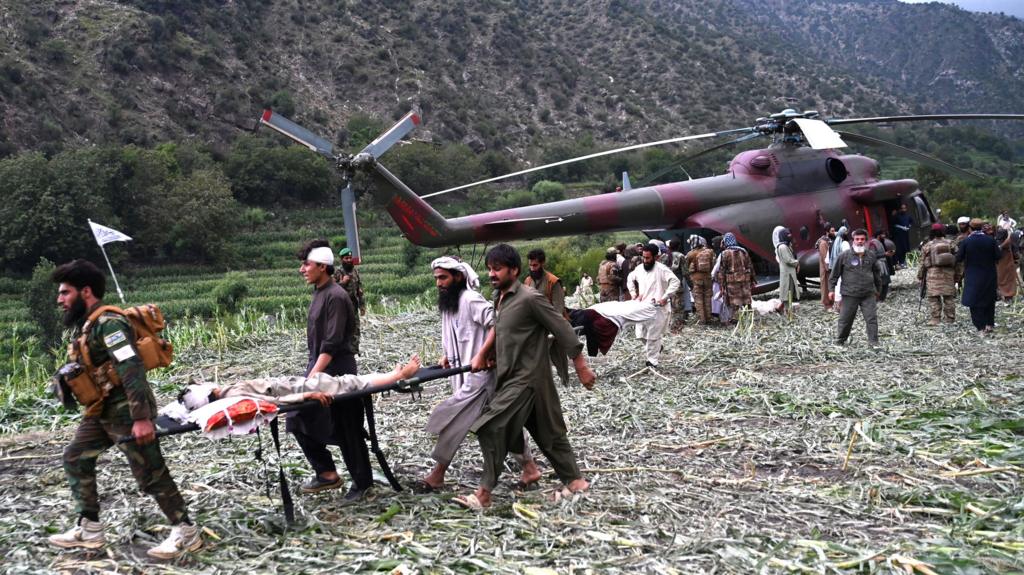“`html
Survivors of the devastating earthquake in eastern Afghanistan, which claimed over 800 lives and left thousands injured, have spent a night exposed to the elements as rescue operations continue.
The majority of fatalities occurred in the mountainous Kunar province, the area closest to the epicenter of the magnitude 6.0 earthquake that struck on Sunday evening. Authorities have cautioned that the death toll may rise significantly as entire villages have been reduced to rubble.
Numerous nations have pledged assistance, while access to some villages remains obstructed, and local healthcare facilities are struggling to cope with the influx of casualties.
This disaster compounds Afghanistan’s existing challenges, including a severe drought, reductions in aid, and what the World Food Programme has termed an unprecedented hunger crisis.
The earthquake struck at 23:47 local time (19:47 GMT) on Sunday, approximately 27km (17 miles) east of Jalalabad, the country’s fifth-largest city, located in eastern Nangarhar province.
Faridullah Fazli was asleep in his home in Asadabad, situated on the banks of the Kunar River, when the tremor abruptly awakened him.
“There was a very strong earthquake, accompanied by sounds that were very scary,” he told the BBC.
“We didn’t sleep until morning. After the earthquake, there were small tremors, and there are still.”
Mr. Fazli recounted his experience at the local clinic, assisting in the transportation of the deceased and wounded to ambulances destined for a hospital further south in Nangarhar province.
“It was a very scary situation, just an atmosphere of fear and terror,” he said.
A resident of Mazar Dara, in the Nurgal region, reported that 95% of the village had been destroyed, with five to ten injured individuals in every household.
Kunar, a rugged and mountainous region with limited arable land, bore the brunt of the devastation. The area’s roads are often rudimentary tracks winding through the mountains, and homes are constructed from clay, stones, and mud.
The region has also experienced significant flooding and landslides in recent days, further impeding access to many areas.
Due to the blocked roads, government rescue operations were forced to rely on aerial transport, with teams in helicopters only able to reach affected areas on Monday morning.
“Entire villages are flattened, roads to deep mountainous areas are still closed. So now, for us, the priority is not finding dead under the rubble, but rather reaching out to those injured,” a Taliban official in Kunar province stated.
Reports have emerged of individuals trapped under the debris for hours, succumbing to their injuries while awaiting rescue.
Syed Raheem, a participant in the rescue efforts, stated that while many had been saved, concerns remained for those still trapped.
“Some people sent us messages that there are houses that are destroyed, and some people are still under the rocks,” he told the BBC.
Villagers in the mountains have been assisting each other in the search for the dead and wounded amidst the collapsed structures.
Joy Singhal, a regional spokesperson for the Red Cross, told Al Jazeera that survivors are apprehensive about returning to their homes, even if structurally sound, due to concerns about aftershocks, adding that the availability of tents in the region is insufficient.
Several nations, including China, India, the UK, and Switzerland, have pledged aid contributions. The UK’s emergency funding “will help our partners to deliver critical healthcare and emergency supplies to the most hard-hit”, Foreign Secretary David Lammy said.
Jalalabad’s main hospital is overwhelmed, situated at the epicenter of the crossing point for tens of thousands of Afghans being deported from neighboring Pakistan.
Chaotic scenes unfolded on Monday, with injured individuals and distressed relatives searching for their loved ones amidst the flurry of volunteers and rescue teams.
One grieving woman recounted the loss of family members in the earthquake, while an elderly man appeared disoriented and unable to communicate.
A medical professional reported that approximately 460 victims had been admitted since the earthquake, with 250 requiring hospitalization and the remainder treated and discharged.
Limited internet connectivity in the affected areas is hindering communication and coordination efforts.
Since August 2021, Afghanistan has been under the governance of the Taliban, whose government is only formally recognized by Russia.
Numerous aid organizations and non-governmental organizations suspended their operations in Afghanistan following the Taliban’s return to power.
The majority of foreign aid to Afghanistan has been suspended, and international sanctions, dating back to the Taliban’s initial rule in the 1990s, remain in effect, although humanitarian relief efforts have been granted exemptions.
The UK’s funding will be channeled through the UN’s population fund and the Red Cross.
Afghanistan is prone to earthquakes due to its location on several fault lines.
In 2023, a series of earthquakes in the Herat province resulted in over 1,000 fatalities, following the deaths of approximately 2,000 people in Paktika province the previous year.
The recent earthquake’s high casualty rate is attributed to its shallow depth of 8km (5 miles), and its impact was felt 140km away in the capital, Kabul, and in neighboring Pakistan. Earthquakes occurring less than 70km below the surface are classified as shallow.
Shallow earthquakes are common in Afghanistan, particularly in the Himalayan foothills where tectonic plates are converging.
At least 800 people have been killed and thousands injured in the east of the country after a 6.0 magnitude earthquake struck on Sunday night.
Cut off by rock falls in the mountains, locals who survived the tremors help pull injured and dead from the rubble.
Hundreds of people are thought to have died in the quake, which struck in a mountainous eastern region.
Last month it emerged that the details of almost 19,000 people who had applied to move to the UK were leaked.
Fixtures, results and scorecards from the Twenty20 tri-series hosted by the United Arab Emirates, also featuring Afghanistan and Pakistan.
“`

